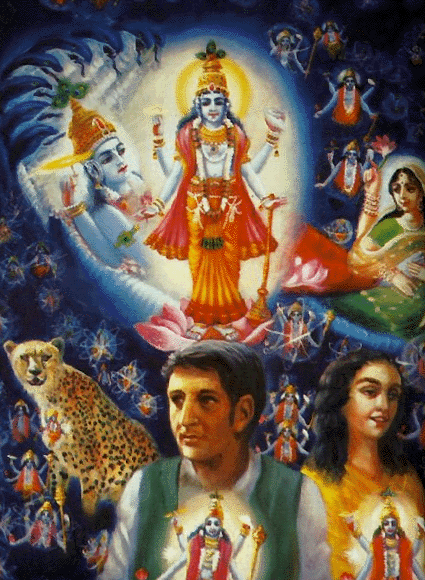

Lord Caitanya Mahaprabhu accepted the doctrine of Sri Madhvacarya, while at the same time recognizing certain important aspects contained in the tattva of the other three Vaisnava sampradayas. Lord Caitanya brought these teachings together in the perfection of prema dharma.
Lord Caitanya's own words, as quoted by Sri Jiva Goswami:
"From Madhva I will take two essential teachings: his complete rejection and defeat of the Mayavadi philosophy and his service to the deity of Krishna, accepting Him as an eternal spiritual personality.
From Ramanuja, I will accept two teachings: the concept of devotional service, unpolluted by karma and jnana, and service to the devotees.
From Vishnuswami's teachings I will accept two elements: the sentiment of exclusive dependence on Krishna and the path of raga-marga, or spontaneous devotion.
From Nimbarka, I will take two very important principles: the necessity of taking shelter of Srimati Radharani and the high esteem of the gopi's love for Krishna."
"Lord Caitanya instructed the mass of people in the sankhya philosophy of acintya-bhedabheda-tattva, which maintains that the Supreme Lord is simultaneously one with and different from His creation. Lord Caitanya taught this philosophy through the chanting of the holy name of the Lord. He taught that the holy name of the Lord is the sound incarnation of the Lord and that since the Lord is the absolute whole, there is no difference between His holy name and His transcendental form. Thus by chanting the holy name of the Lord one can directly associate with the Supreme Lord by sound vibration. As one practices this sound vibration, one passes through three stages of development: the offensive stage, the clearing stage and the transcendental stage. In the offensive stage one may desire all kinds of material happiness, but in the second stage one becomes clear of all material contamination. When one is situated on the transcendental stage, one attains the most coveted position--the stage of loving God. Lord Caitanya taught that this is the highest stage of perfection for human beings."
Caitanya-caritamrta, Adi lila, Preface
"....The Supreme Personality of Godhead, who emanates the material and spiritual worlds, is the Supreme Spirit. As an individual spirit soul is almost identical to his gross and subtle bodies, so the Supreme Lord is almost identical to the material and spiritual worlds. The material world, full of conditioned souls trying to lord it over matter, is a manifestation of the external energy of the Supreme Lord, and the spiritual world, full of perfect servitors of the Lord, is a manifestation of His internal energy. Since all living entities are minute sparks of the Supreme Personality of Godhead, He is the Supreme Soul in both the material and spiritual worlds. The Vaisnavas following Lord Caitanya stress the doctrine of acintya-bhedabheda-tattva, which states that the Supreme Lord, being the cause and effect of everything, is inconceivably, simultaneously one with His manifestations of energy and different from them."
Caitanya-caritamrta, Adi lila 2:37
"....We Gaudiya Vaisnava follow Srila Ramanuja's philosophy almost in the same manner. Sri Caitanya Mahaprabhu gives the identification of jiva soul as the eternal servant of Krishna and is situated as marginal potency of the Lord based on the philosophy of acintya-bheda bheda-tattva. This is almost similar to Visistadvaita vada. Vaisnava philosophy is now being pushed on all over the world under the Hare Krishna movement, and we feel Sripada Ramanuja a great support for the Vaisnava philosophical understanding. It is like a combination of nyaya sruti and smrti prasthans. The Bhagavad-gita supports the Vedanta Sutra brahma-sutra-padais caiva. hetumadbhir viniscitaih.
(BG. 13:5.)
To the jiva brahma identification is one part of acintya-bheda bheda-tattva. As spirit soul or identical brahma, or jiva brahma is identical with the Supreme Brahma or the param brahma. In this sense jiva soul is avheda or non-different from the param brahma. But on account of the param brahma being the supreme, the biggest, the identical brahma or jiva brahma being very minute, it is different from the param brahma. The summary is that the simultaneous one and different jiva brahma is simultaneously one with and different from the param brahma. Because it is appreciated simultaneously which is very difficult to comprehend by the common man, this philosophy is called acintya-bheda bheda tattva, inconceivable. This is supported by the Katho Upanisad 2.5.13 nityo nityanam cetanas cetananam. eko bahunam yo vidadhati kaman. This is almost similar to the visista-dvaita vada.
So far I am personally concerned, following the footsteps of my guru maharaj Srila Bhaktisiddhanta Sarasvati Thakura Prabhupada, we accept the principles of all the acaryas, although officially we belong to the Madhva sampradaya. Our sampradaya is known as the Madhva Gaudiya sampradaya. We find great shelter at the lotus feet of Sri Ramanujacarya because his lotus feet are the strongest fort to combat the mayavadi philosophy."
Srila Prabhupada Letter to V.S.R. Chakravarti, 11-24-74
![[BVML Home Page]](../../grfx/bml_logo.gif)
